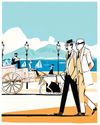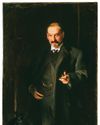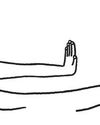
In 1966, the critic Irving Howe published an essay whose title, "The Other Singer," testified to a literary usurpation. For American readers in the nineteen-sixties, the name Singer meant Isaac Bashevis Singer, the only Yiddish writer to have reached the pinnacle of the American literary world. Singer's stories about Jewish life in Poland, where he was born, and New York, where he settled in 1935, appeared in the Forward, the city's leading Yiddish newspaper, before they were published in English in magazines including this one, Harper's, and Playboy.
It was an era when Jewish fiction was in vogue, with writers like Saul Bellow and Philip Roth on the best-seller lists; Singer won the National Book Award twice. In 1978, he became the first (and, to this day, the only) Yiddish writer to win the Nobel Prize in Literature.
In Howe's opinion, however, the ascent of I. B. Singer-known to Yiddish readers by his nom de plume, Bashevis was not a cause for celebration, because it meant the eclipse of a better writer: his older brother, Israel Joshua Singer. In the thirties and forties, it was I. J. Singer who was the star contributor to the Forward, writing both fiction and journalism, and whose books got translated in America and Europe. Maximillian Novak, a Yiddish scholar, writes in his book "The Writer as Exile: Israel Joshua Singer" that when Singer's epic novel "The Brothers Ashkenazi" was published, in 1936, he was compared to Tolstoy and mentioned as a future candidate for the Nobel Prize.
When he died, from a heart attack, in 1944, at the age of fifty, his younger brother Isaac was almost completely unknown.
This story is from the December 04, 2023 edition of The New Yorker.
Start your 7-day Magzter GOLD free trial to access thousands of curated premium stories, and 9,000+ magazines and newspapers.
Already a subscriber ? Sign In
This story is from the December 04, 2023 edition of The New Yorker.
Start your 7-day Magzter GOLD free trial to access thousands of curated premium stories, and 9,000+ magazines and newspapers.
Already a subscriber? Sign In

BADDIE ISSUES
\"Wicked\" and \"Gladiator II.\"

LET'S MAKE A DEAL
\"Death Becomes Her\" and \"Burnout Paradise.\"

ANTI HEROES
\"The Franchise,\" on HBO.

FELLOW-TRAVELLERS
The surprisingly sunny origins of the Frankfurt School.

NOW YOU SEE ME
John Singer Sargent's strange, slippery portraits of an art dealer's family.

PARIS FRIEND - SHUANG XUETAO
Xiaoguo had a terror of thirst, so he kept a glass of water on the table beside his hospital bed. As soon as it was empty, he asked me to refill it. I wanted to warn him that this was unhealthy - guzzling water all night long puts pressure on the kidneys, and pissing that much couldn't be good for his injury. He was tall, though, so I decided his insides could probably cope.

WILD SIDE
Is Lake Tahoe's bear boom getting out of hand?

GETTING A GRIP
Robots learn to use their hands.

WITHHOLDING SEX FROM MY WIFE
In the wake of [the] election, progressive women, who are outraged over Donald Trump's victory at the ballot box, have taken to social media with public, vengeful vows of chastity. - The Free Press.

DEADLINE EXTENSION
Old age, reborn.